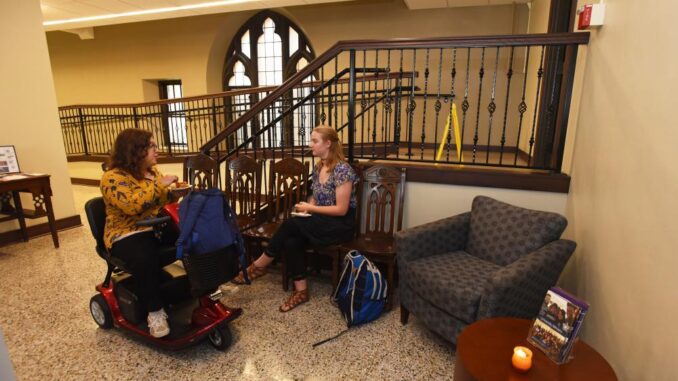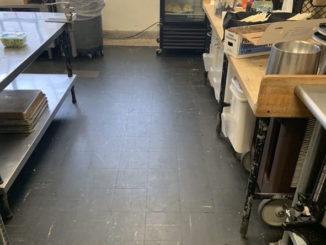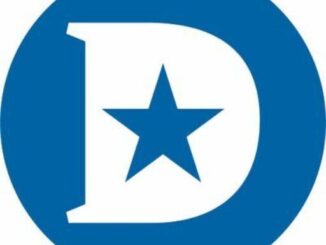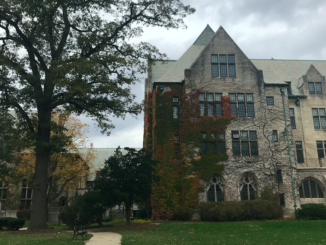
By: Andrew Mariotti
A year of largely online learning has affected students at Dominican University, especially students with disabilities.
One of the major challenges with online learning has been the “executive function”, meaning that it can be hard for students to plan and organize their schoolwork and manage their time, according to Dominican’s Disability Support Services (DSS).
“The online platform can be a little bit more of a challenge because it’s not as structured,” said Danielle Bank, DSS coordinator.
DSS tries to face that challenge head-on.
“We’re connecting students with on-campus resources that will allow them to continue to connect, whether that’s from office hours with their instructor, through tutoring at the Academic Enrichment Center (AEC), or by connecting with Mari Callahan-Ross or myself with advising,” Bank said.
Graphic Design major Ximena Castillo has an e-reader and extra time on tests to help her cope with dyslexia and attention deficit hyperactivity disorder (ADHD). She uses the AEC and is a regular visitor to Bank’s office hours.
“They teach me different ways to take my notes on lectures and I still do it now which is so helpful,” Castillo said. “They are so reassuring.”
Each condition presents specific challenges, she said.
With dyslexia, “I have a hard time looking at a screen because I feel that the text is weird, my eyes shift more, and I tend to guide my hand over texts to read words,” Castillo said.
With ADHD, “Zoom has gotten so bad because I have to work twice as hard to focus because my brain works better having a space I know I have to focus in. If I am at home, my brain is not wired to think the same way as if I were in a classroom because I get distracted easily, especially by my dogs,” Castillo said.
Castillo takes advantage of the DSS office hours and the AEC tutoring, especially with her best friend, tutor Meghan O’Leary.
“Anytime I have graphics with a lot of type, I’ll send it her way, so she can spell check it just to make sure I don’t have any typos in my design,” Castillo said.
O’Leary is a tutor in the AEC helping students improve their writing.
She assists students with papers in their courses whether it is helping them start constructing a rough draft or checking over a finalized paper. She also checks over graduate school statements to help students apply.
“We’re not trying to write the papers for them and we’re not trying to do the work for them. We’re trying to help them along with their thinking process,” O’Leary said.
After the session is over, O’Leary gives the student her email and informs them that if they want, they can send her the revised work from the first session, and she will give them additional feedback before they submit the final version.
She also tutors when her hours are over and throughout the weekend to help students with their work if they have a busy schedule.
“I had a student who could not meet my hours, so I sent a Zoom link to help her out,” O’Leary said. “I still dedicate my time to students.”
O’Leary is always open and extends her help to students to make them successful in their studies.
“I’ve had people come back to me from last semester because they think I was of help to them and they told me they got an A in the class,” O’Leary said. “I get so excited, and I feel good that they are progressing and succeeding.”
The AEC also offers coaching sessions for all Dominican students, with sessions on time management, note-taking, and test-taking strategies. The DSS offers similar academic support and more such as executive functioning, self-advocacy and accommodations in virtual office hours.
Students may have a testing accommodation that states they may need paper testing. If this is the case, they would come into the AEC no matter what the modality of the course is.
Students may also have a testing accommodation for a distraction-reduced test environment. If this is the case, it can be accommodated in an online setting, but students can still come into the AEC if they find it to be more beneficial for their tests.
To proctor a test in an online setting would be done through Zoom. The DSS would “send a student an invite on Outlook and then the student would access their exam, usually through Canvas or whatever platform it’s been assigned, and you would share your screen with us, and we would monitor you that way,” Bank said.
Additional online support students are receiving with their accommodations are the use of Kurzweil, Dragon Dictate, and being able to access courses remotely, if needed.
Kurzweil acts as an e-reader support that puts the text online where it will electronically read you the text. Students can also highlight and take notes on the platform.
Dragon Dictate acts as a speech-to-text support for students who have trouble with handwriting.
The DSS is also in “the process of working with IT and other campus communities to access adaptive technology needs for all students, including those with disabilities, with a focus on universal design,” Bank said.
Due to this online transition, DSS has seen an increase in the number of students requesting accommodations.
“This is due to a multitude of factors, including instances in which students have needed additional support to access their online courses as well as addressing health concerns that may be impacted by the pandemic,” Bank said.
As of right now, DSS is serving 232 students that include both permanent and temporary accommodations.
amariotti@my.dom.edu
*photo from Disability Support Services website



